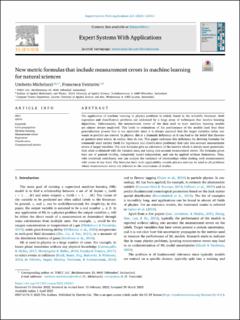Please use this identifier to cite or link to this item:
https://doi.org/10.21256/zhaw-28559| Publication type: | Article in scientific journal |
| Type of review: | Peer review (publication) |
| Title: | New metric formulas that include measurement errors in machine learning for natural sciences |
| Authors: | Michelucci, Umberto Venturini, Francesca |
| et. al: | No |
| DOI: | 10.1016/j.eswa.2023.120013 10.21256/zhaw-28559 |
| Published in: | Expert Systems with Applications |
| Volume(Issue): | 224 |
| Issue: | 120013 |
| Issue Date: | Aug-2023 |
| Publisher / Ed. Institution: | Elsevier |
| ISSN: | 0957-4174 1873-6793 |
| Language: | English |
| Subjects: | Machine learning; Metrics; Physics; Computational physics; Measurement error; Error propagation; Regression; Classification |
| Subject (DDC): | 006: Special computer methods 530: Physics |
| Abstract: | The application of machine learning to physics problems is widely found in the scientific literature. Both regression and classification problems are addressed by a large array of techniques that involve learning algorithms. Unfortunately, the measurement errors of the data used to train machine learning models are almost always neglected. This leads to estimations of the performance of the models (and thus their generalization power) that is too optimistic since it is always assumed that the target variables (what one wants to predict) are correct. In physics, this is a dramatic deficiency as it can lead to the belief that theories or patterns exist where, in reality, they do not. This paper addresses this deficiency by deriving formulas for commonly used metrics (both for regression and classification problems) that take into account measurement errors of target variables. The new formulas give an estimation of the metrics which is always more pessimistic than what is obtained with the classical ones, not taking into account measurement errors. The formulas given here are of general validity, completely model-independent, and can be applied without limitations. Thus, with statistical confidence, one can analyse the existence of relationships when dealing with measurements with errors of any kind. The formulas have wide applicability outside physics and can be used in all problems where measurement errors are relevant to the conclusions of studies. |
| URI: | https://digitalcollection.zhaw.ch/handle/11475/28559 |
| Fulltext version: | Published version |
| License (according to publishing contract): | CC BY 4.0: Attribution 4.0 International |
| Departement: | School of Engineering |
| Organisational Unit: | Institute of Applied Mathematics and Physics (IAMP) |
| Appears in collections: | Publikationen School of Engineering |
Files in This Item:
| File | Description | Size | Format | |
|---|---|---|---|---|
| 2023_Michelucci-Venturini_New-metric-formulas-including-measurement-errors-in-ML.pdf | 676.83 kB | Adobe PDF |  View/Open |
Show full item record
Michelucci, U., & Venturini, F. (2023). New metric formulas that include measurement errors in machine learning for natural sciences. Expert Systems with Applications, 224(120013). https://doi.org/10.1016/j.eswa.2023.120013
Michelucci, U. and Venturini, F. (2023) ‘New metric formulas that include measurement errors in machine learning for natural sciences’, Expert Systems with Applications, 224(120013). Available at: https://doi.org/10.1016/j.eswa.2023.120013.
U. Michelucci and F. Venturini, “New metric formulas that include measurement errors in machine learning for natural sciences,” Expert Systems with Applications, vol. 224, no. 120013, Aug. 2023, doi: 10.1016/j.eswa.2023.120013.
MICHELUCCI, Umberto und Francesca VENTURINI, 2023. New metric formulas that include measurement errors in machine learning for natural sciences. Expert Systems with Applications. August 2023. Bd. 224, Nr. 120013. DOI 10.1016/j.eswa.2023.120013
Michelucci, Umberto, and Francesca Venturini. 2023. “New Metric Formulas That Include Measurement Errors in Machine Learning for Natural Sciences.” Expert Systems with Applications 224 (120013). https://doi.org/10.1016/j.eswa.2023.120013.
Michelucci, Umberto, and Francesca Venturini. “New Metric Formulas That Include Measurement Errors in Machine Learning for Natural Sciences.” Expert Systems with Applications, vol. 224, no. 120013, Aug. 2023, https://doi.org/10.1016/j.eswa.2023.120013.
Items in DSpace are protected by copyright, with all rights reserved, unless otherwise indicated.